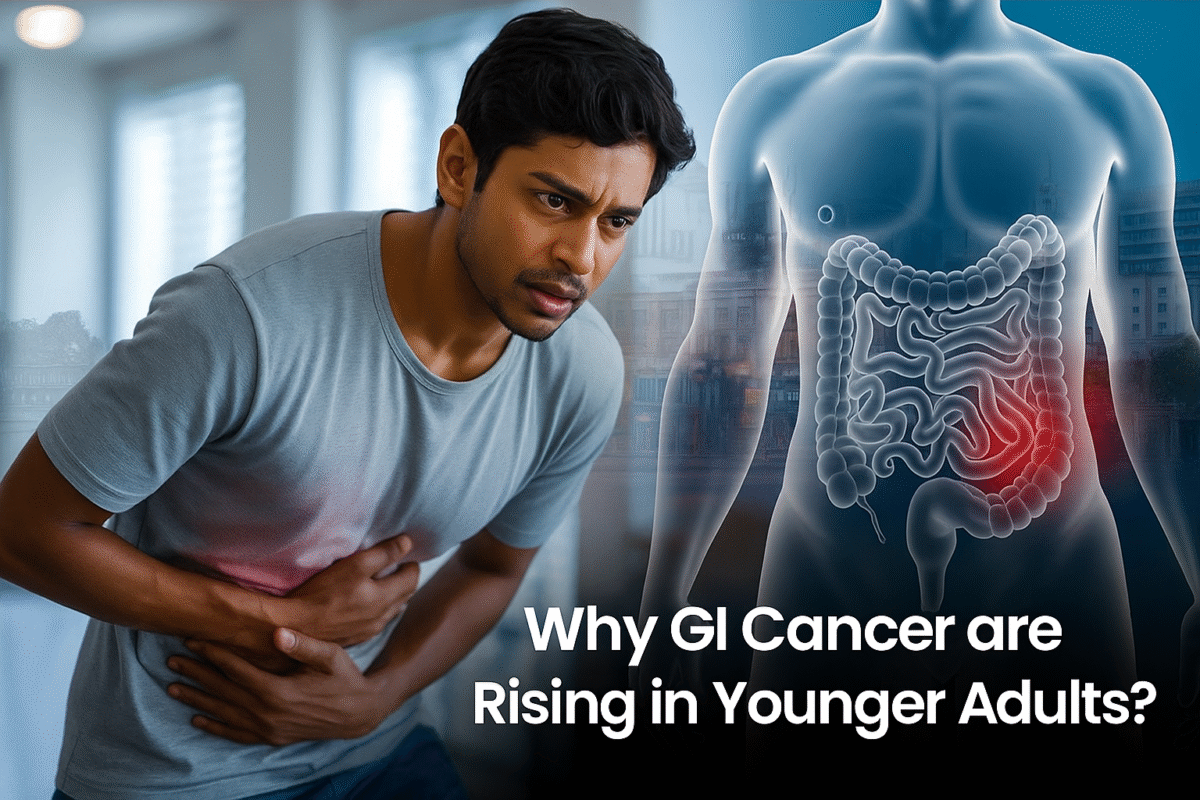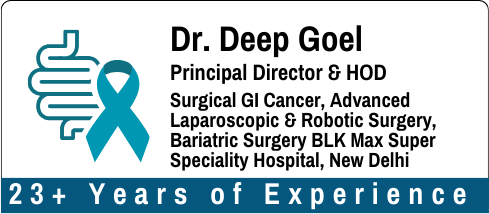Why GI Cancers Are Rising in Younger Adults?

For a long time, gastrointestinal (GI) cancers, which include cancers of the colon, stomach, pancreas, and esophagus, were considered diseases of older adults. But that’s changing fast; today, more people under 50 are being diagnosed with these cancers, sometimes even in their 20s and 30s.
This trend has raised serious questions: Why are these cancers increasing so quickly? And what can young adults do to protect themselves?
Dr. Deep Goel explains, “We’re witnessing a troubling rise in digestive cancers among young adults. Lifestyle and dietary changes over just one or two generations have had a profound impact on gut health.”
This blog will help you understand what’s causing this rise, the symptoms to watch out for, and how to lower your risk.
What Are GI Cancers?
GI cancers are malignancies that start in the digestive system, the esophagus, stomach, liver, pancreas, colon, rectum, and related organs. Traditionally, these were diseases of older adults. But studies now show a steady increase in early-onset GI cancers.
In recent years, colorectal cancer, in particular, has become the leading cause of cancer death among adults ages 20-49, with other GI cancers also increasing sharply.
How Common Is the Increase?
- The last decade has seen early-onset GI cancer cases rise by nearly 15% worldwide
- Colorectal cancer rates have doubled, or more, in young adults aged 20–39
- The sharpest increases appear in women, minorities, and those with a family history of GI cancers
Which GI Cancers Are Increasing?
Some of the fastest rising GI cancers in young adults are:
- Colorectal (colon and rectum)
- Stomach (gastric)
- Pancreatic
- Esophageal
- Biliary tract and appendix
These cancers were once mostly seen in people over 50, but are now affecting people in their 20s, 30s, and 40s.
Why Are GI Cancers Rising in Young People?
The rise in GI cancers among younger adults doesn’t stem from a single cause; it’s the result of multiple overlapping factors that affect our daily lives.
1. Lifestyle and Diet Changes
Our diets have changed dramatically over the past few decades.
- Processed foods, sugary drinks, and red meat have replaced fresh, home-cooked meals
- Low-fiber diets disrupt digestion and damage gut bacteria
- Obesity and inactivity slow metabolism and increase hormonal imbalances
- Smoking and alcohol further irritate the digestive lining and raise cancer risk
According to Dr. Deep Goel, “The gut is a mirror of how we live. Unhealthy diets, lack of activity, and stress not only cause acidity or bloating, they create the foundation for chronic inflammation, which can eventually lead to cancer.”
2. Environmental Factors
Our gut houses trillions of bacteria collectively known as the gut microbiome, which protects against disease. But modern life has disturbed this delicate balance.
- Antibiotic overuse, pollution, and microplastics damage healthy bacteria
- Chemical exposure and poor diet increase inflammation
A disrupted microbiome makes it easier for abnormal cells to form and grow, paving the way for cancer.
3. Genetics and Family History
While most early-onset cases are lifestyle-related, genetics still play a part. Inherited mutations such as Lynch Syndrome, FAP, and BRCA genes increase the risk of colorectal or pancreatic cancer.
If a parent, sibling, or close relative has had GI cancer, your own risk rises, and you should begin screening earlier than age 45.
4. Medical Conditions and Infections
Certain long-term health conditions can increase risk:
- Inflammatory Bowel Disease (IBD)
- Chronic acid reflux or gastritis
- Helicobacter pylori infection (linked to stomach cancer)
- Non-alcoholic fatty liver disease
All of these cause prolonged inflammation and damage the cells lining your digestive organs.
Symptoms and Warning Signs
Most early-onset GI cancers are caught late, partly because screening usually starts at age 45–50, and younger adults are less likely to be tested. Symptoms that should never be ignored include:
- Unexplained weight loss
- Persistent abdominal pain or discomfort
- Blood in stool or rectal bleeding
- Changes in bowel habits (lasting several weeks)
- Lasting indigestion, nausea, or vomiting
- Difficulty swallowing, persistent fatigue
If any of these last for more than a few weeks, consult a healthcare professional. As Dr. Deep Goel cautions, “Cancer doesn’t wait for age. If your body keeps giving you warning signals, don’t dismiss them as simple gastric problems.”
What Can Young Adults Do to lower risk?
A few simple steps can help reduce risk:
- Eat more fiber-rich foods (vegetables, whole grains, fruits) and cut back on processed foods
- Move regularly and try to be active most days
- Avoid smoking and excessive drinking
- Get to know your family history and talk with your doctor about early screening if there’s a close relative with GI cancer
- Stay alert for symptoms and act promptly, regardless of your age or background
A patient of Dr. Deep Goel shared, “I was just 34 when I started feeling bloated and noticed blood in my stool. I thought it was just stress or acidity, but when it persisted, I decided to consult Dr. Deep Goel. The colonoscopy revealed early-stage colon cancer. Dr. Goel performed a minimally invasive surgery with exceptional care and explained how gut health and diet influence cancer risk. His guidance inspired me to completely change my lifestyle: no processed food, more fiber, and daily walks. Today, I’m healthy, grateful, and far more aware of my digestive health.”
Another patient also shared, “For nearly a year, I relied on antacids and home remedies for constant acidity, thinking it was minor gastritis. When the pain worsened and I began losing weight, I finally went to see Dr. Deep Goel. An endoscopy confirmed early-stage stomach cancer. Thanks to his timely diagnosis, expert surgical care, and post-treatment guidance, I recovered smoothly. Dr. Goel’s emphasis on clean eating, stress management, and regular follow-ups has transformed my life.”
Final Thoughts
The rise in GI cancers among younger adults is one of the most significant health challenges of our time — but it’s not unstoppable. By paying attention to your diet, lifestyle, family history, and early symptoms, you can dramatically reduce your risk.
As Dr. Deep Goel emphasizes, “Early diagnosis and prevention are our strongest weapons. Awareness today can save lives tomorrow.”
FAQs
1. Can stress really cause gastrointestinal cancer?
Chronic stress doesn’t directly cause cancer, but it weakens immunity, disrupts digestion, and worsens inflammation, all of which can increase long-term risk. Managing stress through sleep, meditation, and exercise supports overall gut health.
2. How often should I go for a colonoscopy or GI screening?
For people at average risk, screening is recommended every 10 years starting at age 45. If you have a family history of digestive symptoms, you may need more frequent testing.
3. Are gastrointestinal cancers hereditary?
Yes, around 10–15% of GI cancers are linked to genetic syndromes such as Lynch Syndrome or FAP. If a close family member had colon, stomach, or pancreatic cancer, discuss genetic testing with your gastroenterologist.
4. What kind of diet helps prevent GI cancer?
A plant-based, high-fiber diet rich in fruits, vegetables, legumes, and whole grains supports healthy digestion. Limit processed meats, refined sugar, alcohol, and deep-fried foods to lower your risk.
5. Can GI cancers be cured if detected early?
When diagnosed at an early stage, most GI cancers are highly treatable and often curable with minimally invasive or laparoscopic surgery, followed by a personalized recovery plan.
Explore more blogs: Top 5 Advanced Treatments for Gastrointestinal Cancer in 2025

